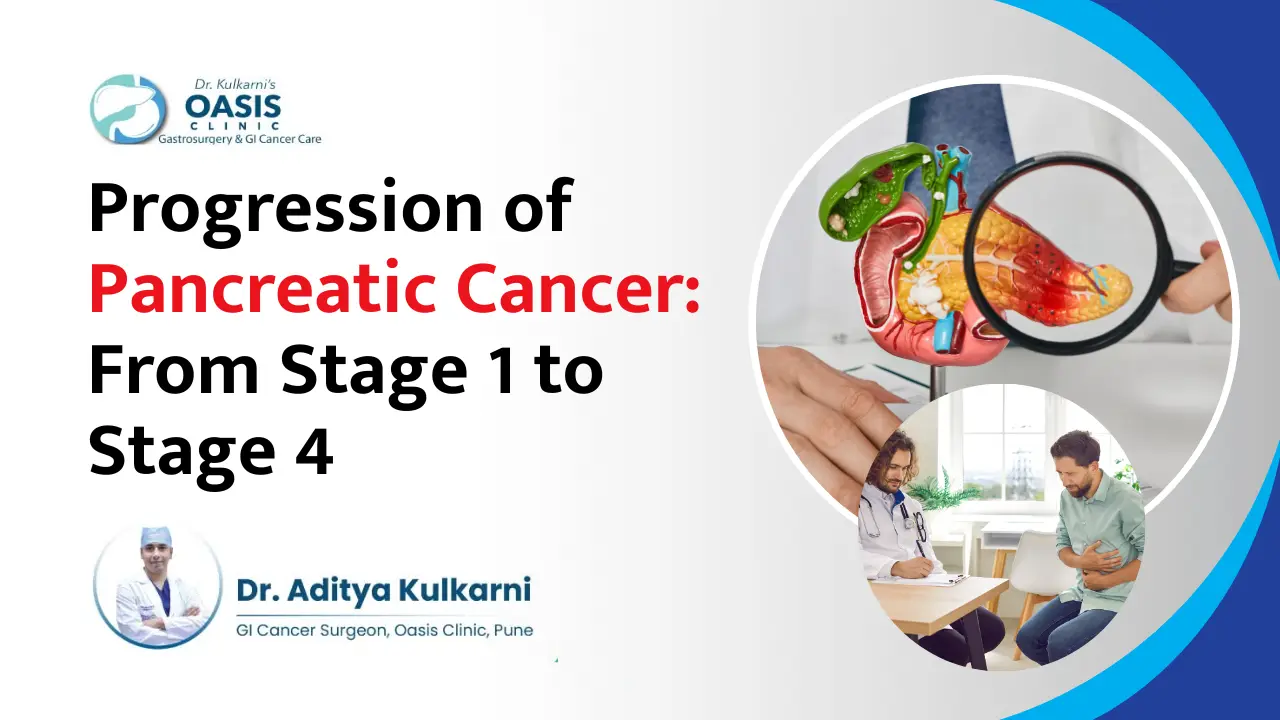Progression of Pancreatic Cancer: From Stage 1 to Stage 4
Pancreatic cancer, a formidable opponent in the realm of medical science, is a disease that has been challenging doctors and researchers alike. As a Gastrointestinal Surgeon with years of experience, I’ve come to understand the importance of patient awareness about this disease.
A clear understanding of its progression can significantly impact early detection, which is paramount in managing pancreatic cancer effectively.

Pancreatic Cancer Staging
- Explanation of the Stages
- How Staging is Determined
- Importance of Accurate Staging for Treatment Planning
Also Read-Pancreatic Cancer Stages,Treatment by Stage
Timeframe for Progression
1. General Timeline from Stage 1 to Stage 4
The timeline for progression from Stage 1 to Stage 4 varies widely among patients. Some may experience rapid progression over months, while others may see a gradual progression over years.
2. Factors Influencing the Speed of Progression
Several factors influence the speed of progression, including the type of pancreatic cancer, the patient’s overall health, and genetic factors.
3. Individual Variations and Unpredictability
Each patient’s journey with pancreatic cancer is unique, making it challenging to predict a specific timeframe for progression. Regular follow-ups and monitoring are crucial.
Symptoms at Each Stage
- Overview of Symptoms in Stage 1
In Stage 1, symptoms can be vague or even non-existent. Some patients may experience mild discomfort in the abdomen or unexplained weight loss.
- Changes and Challenges in Stage 2
As the disease progresses to Stage 2, symptoms become more noticeable. Patients may experience persistent abdominal pain, jaundice, or changes in bowel habits.
- Progression of Symptoms in Stage 3
In Stage 3, symptoms often worsen, with severe abdominal pain, significant weight loss, and increasing fatigue becoming more common.
- Critical Symptoms in Stage 4
By Stage 4, the cancer has spread to other organs, leading to more severe symptoms like intense pain, significant weight loss, and difficulty eating or digesting food.
Prognosis and Treatment Options
1. Survival Rates for Each Stage
Survival rates decrease with each advancing stage. However, early detection and intervention can significantly improve these rates.
2. Importance of Early Intervention
Early intervention, particularly when the cancer is still localized, can provide the best chance for successful treatment and improved survival rates.
3. Available Treatment Options at Different Stages
Treatment options vary based on the stage. Early-stage cancers may be treated with surgery, while advanced stages may require chemotherapy, radiation therapy, or a combination of these.
Case Studies and Real-Life Experiences
- Highlighting Individual Experiences with the Progression
Sharing real-life experiences can provide valuable insights into the journey of dealing with pancreatic cancer. These stories highlight the challenges, victories, and resilience of patients and their families.
- Lessons Learned from Cases with Varying Timelines
Every case offers unique lessons about disease progression, treatment responses, and coping strategies. These lessons can guide future care and provide hope to those newly diagnosed.
- Personal Stories of Survival and Resilience
Personal stories of survival and resilience serve as powerful reminders of the human spirit’s strength in the face of adversity. They inspire hope and courage among patients and their families.
Importance of Regular Check-ups and Early Detection
1. Role of Routine Screenings
Routine screenings play a vital role in early detection. They help identify changes in the body that may indicate the onset of pancreatic cancer.
2. Impact of Early Detection on Prognosis
Early detection significantly improves the prognosis of pancreatic cancer. It provides more treatment options and a better chance for successful management of the disease.
3. Encouraging Awareness and Proactive Healthcare
Promoting awareness about the signs and symptoms of pancreatic cancer encourages proactive healthcare. Regular check-ups and prompt attention to any unusual changes can make a significant difference in early detection.
Research and Advancements
- Ongoing Research in Pancreatic Cancer
Ongoing research aims to improve our understanding of pancreatic cancer, develop new diagnostic tools, and create more effective treatments. These efforts are crucial for improving patient outcomes.
- Promising Advancements in Early Detection and Treatment
Recent advancements show promise in enhancing early detection and treatment effectiveness. From innovative imaging techniques to targeted therapies, the future holds great potential.
- Future Prospects for Improved Outcomes
With continued research and clinical trials, we can expect significant improvements in the diagnosis, treatment, and management of pancreatic cancer in the future.
Also Read – Why Pancreatic Cancer is Diagnosed at a Late Stage?
Support and Resources
1. Supportive Networks for Individuals and Families
Support networks provide emotional, psychological, and practical support for individuals diagnosed with pancreatic cancer and their families. These communities can be invaluable during this challenging journey.
2. Resources for Coping with a Pancreatic Cancer Diagnosis
Resources such as counselling services, informational materials, and financial aid programs can help patients and families cope with the diagnosis and navigate the treatment process.
3. Importance of Seeking Professional Advice and Assistance
Seeking advice from experienced Gastrointestinal Surgeons like Dr. Aditya Kulkarni is crucial for understanding the disease, exploring treatment options, and making informed decisions.
In conclusion, Understanding pancreatic cancer’s progression from Stage 1 to Stage 4 is essential in demystifying this complex disease. As we continue our relentless pursuit of advancements in detection and treatment, remember that proactive healthcare, early intervention, and a resilient spirit can make a significant difference. Let’s remain hopeful and committed to fighting this battle together.

Dr. Aditya Kulkarni
MS, DNB, FRCS, MCh (Surgical Gastroenterology & GI Oncology)
Dr. Aditya Kulkarni is a Consultant of Laparoscopic and Robotic Gastrointestinal, Hepato-biliary-pancreatic, and Cancer Surgeon at the Renowned Oasis Surgery Clinic Pune.
